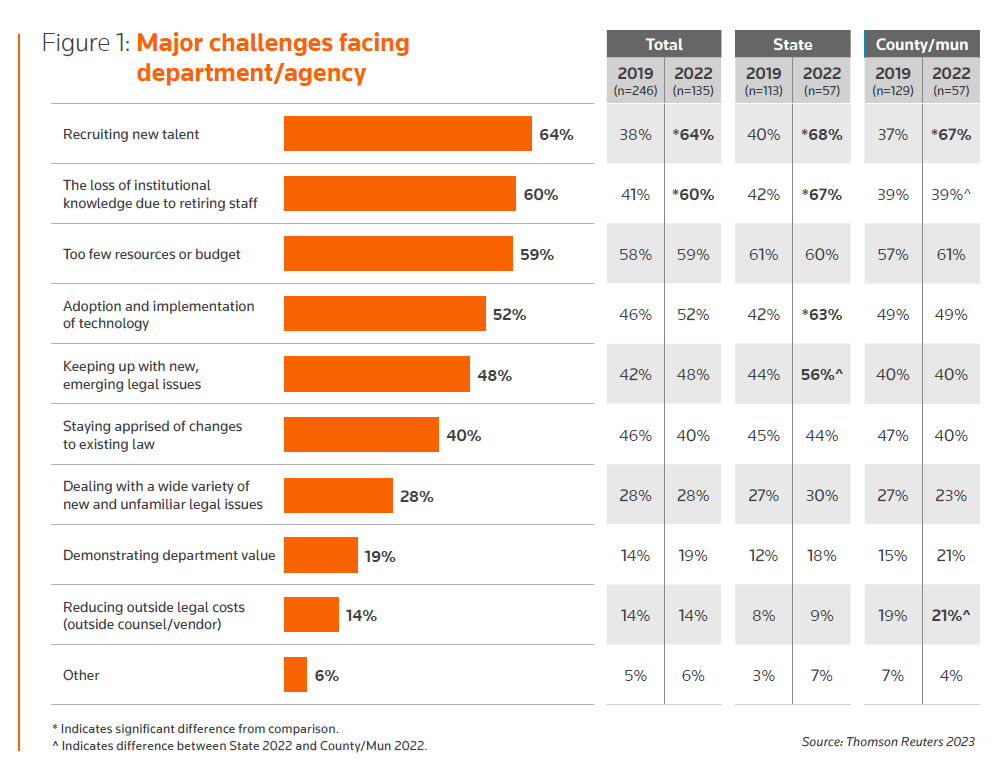A new report illustrates the challenges faced by government law agencies, especially around issues like employee hiring & retention and adopting needed technology
For many government law agencies and for the legal professionals at other government departments, the past few years have been a bit of a bumpy ride. As agencies, and departments — like many institutions and corporations all over the world — had to scramble to find new ways of doing business during the global pandemic and its resulting lockdowns.
For public legal departments — like the offices of district attorneys, public defenders, or city and county attorneys — that meant holding online meetings and virtual hearings. Beyond that, it meant that much more work was being done remotely using technology that may have been new to many government agency leaders. And now, as the worst of the pandemic ebbs in many regions of the country and the rest of the world, government agency law departments have had to adapt to the new reality again, deciding which innovations to keep and which to jettison in favor of more traditional ways of conducting business.
To examine these developments further, the Thomson Reuters Institute has published the new 2023 Government Law Agency Report, which summarize the findings of recent Government Trends Survey, conducted in 2022 by Thomson Reuters’ Market Research and Competitive Insights team with attorneys in public agencies at the Federal, State, and County/Municipal level. The objective of this survey is to gain some insight into the opportunities and challenges that legal professionals at public law departments are facing.
You can download a copy of the Thomson Reuters Institute’s new “2023 Government Law Agency Report” here.
In the report, we identify where the main challenges now are for government law agencies, what their current work processes involve (especially around technology use and outsourcing), how they are managing staffing issues, and what has been the ongoing impact of the pandemic.
Indeed, the report reveals that while many government law departments were resilient in handling a myriad of challenges, they were still vexed by some long-standing issues that were evident even before the onset of the pandemic, such as staffing and succession. Beyond staffing issues, many of the challenges government law agency leaders cited fell into several major areas of concern, including the growing complexity of the legal work they see, the ongoing challenges of remote working, problems of technology adoptions, and security fears.
How the leaders of government law agencies and other legal departments navigate their teams through these challenges will likely determine how effective and efficient their legal organizations will remain now and in the future.

Other important insights in the report include:
-
-
- Staffing issues were the top challenges cited for government agencies, while recruiting new talent (64%) and loss of institutional knowledge due to retiring staff (60%) increased dramatically as top concerns.
- While 49% of respondents say tech investment within their agency has increased in the past two years, 59% say their technology resources lag behind the private sector. Worse yet, only 23% say they are confident that they have the necessary tools to do their job effectively.
- On average, government law agencies report that more than one-third (37%) of their legal research issues are complex, and that there is less time to thoroughly research complex items. In fact, almost two-thirds of respondents said they have seen increases in the complexity of the legal issues they face, and 59% saw an increase in the variety of issues. However, only 17% said they have seen an increase in the amount of resources provided to address these needs, and hiring of outside counsel remains low.
- Most respondents said their work environment contains either hybrid or remote arrangements, indicating that many of the changes made during the pandemic have remained.
- At least 28% of government law departments or legal agencies have experienced security breaches or malware infections.
-
Even as government law departments and government legal agencies continue to adapt to the many changes and challenges brought by the pandemic, they look to forge a new future in which they can take the best of the new technology and innovative work processes they used during the crisis — such as virtual meetings and remote working, for example — to make themselves even more effective and efficient.
Yet, staffing issues, security concerns, and the growing complexity of their own work has made the jobs of many government legal professionals more difficult as easy solutions continue to be elusive.
That means, of course, that public investment in these agencies is necessary in order to give agencies the tools, technicians, and highly trained legal staff these teams will need to work to their maximum abilities on behalf of the American public.







